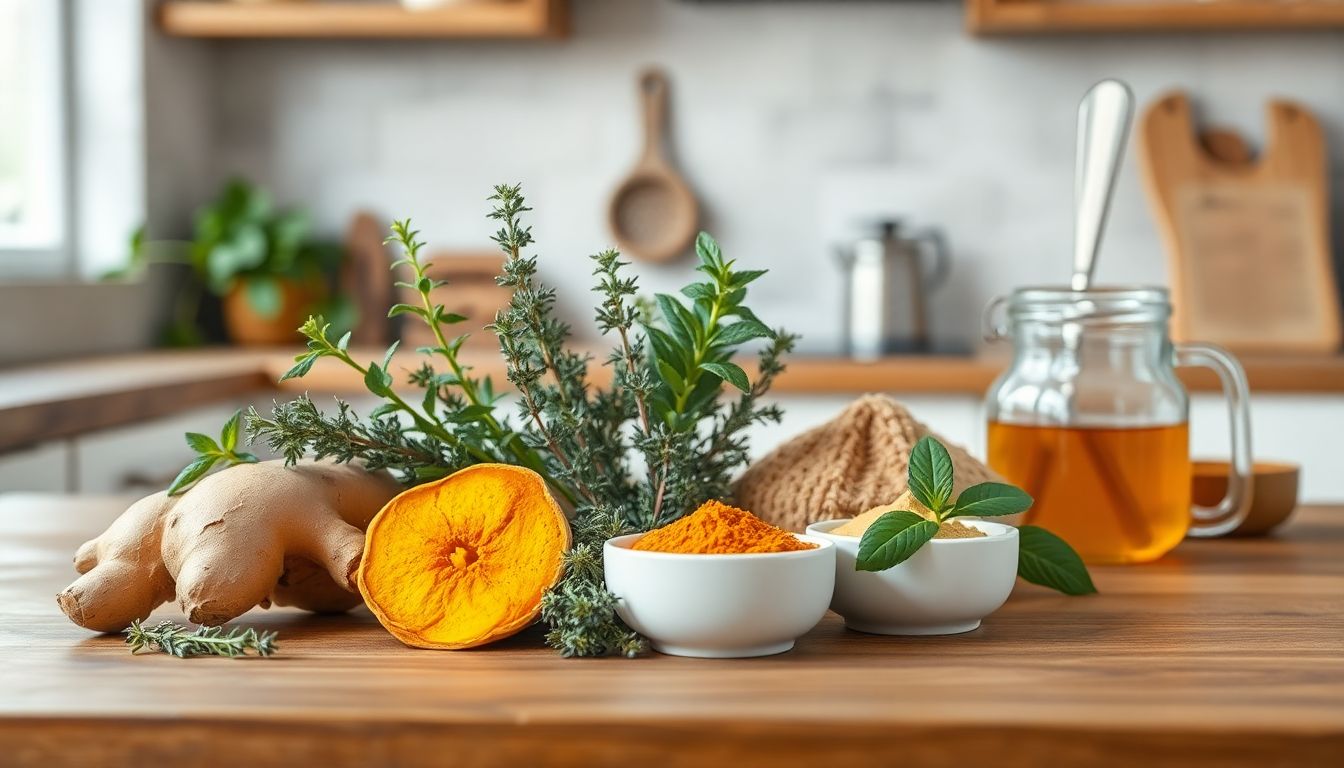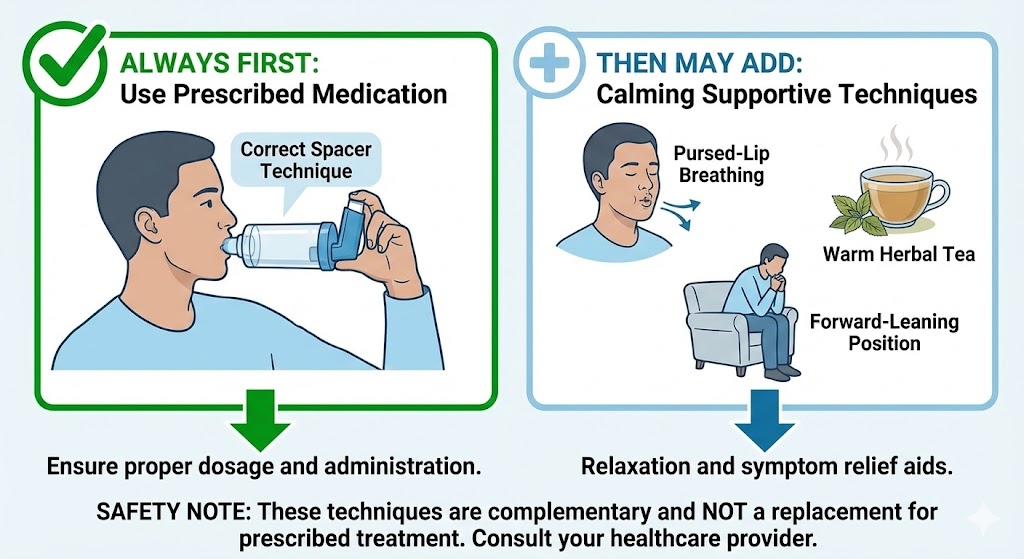You already know about mullein’s amazing mucus-clearing abilities. But what if you could create a complete respiratory support toolkit from your kitchen shelf?
The truth is, nature provides multiple herbs and spices that approach respiratory health from different angles. Some are anti-inflammatory powerhouses. Others are natural antibiotics. Some help relax constricted airways, while others stimulate immune function.
The most effective approach? Combining these natural remedies to create a comprehensive strategy for breathing easier.
While mullein excels at clearing existing mucus, these 5 additional herbs and spices address the root causes of respiratory issues: inflammation, infection, bronchial constriction, and immune weakness.
Here’s how to build your complete natural respiratory pharmacy beyond mullein.
1. Ginger: The Bronchial Relaxer
Why It Works: Ginger contains gingerols and shogaols that have natural anti-inflammatory and bronchodilating properties. It helps relax constricted airway muscles, making it easier to breathe during asthma attacks or COPD flare-ups.
The Science: A study in the American Journal of Respiratory Cell and Molecular Biology found that ginger components significantly reduce airway inflammation and may enhance the effect of conventional bronchodilators.
How to Use:
- Tea: Steep 5-7 thin slices of fresh ginger in hot water for 10 minutes
- Cooking: Add grated ginger to stir-fries, soups, and smoothies
- Supplements: 1-2 grams of ginger powder daily
Best For: Asthma, bronchial constriction, inflammatory cough
Pro Tip: Combine ginger with our lung-health smoothie recipes for a delicious daily dose.
2. Turmeric: The Inflammation Fighter
Why It Works: Curcumin, the active compound in turmeric, is one of nature’s most potent anti-inflammatories. It specifically targets the inflammatory pathways that cause airway swelling and mucus overproduction.
The Science: Research in the Journal of Clinical Immunology showed that curcumin can significantly reduce inflammatory markers in respiratory conditions and may help prevent airway remodeling in chronic asthma.
How to Use:
- Golden Milk: Mix 1 tsp turmeric with warm milk (dairy-free) and honey
- Cooking: Add to curries, soups, and salad dressings
- Critical: Always combine with black pepper and healthy fats to increase absorption
Best For: Chronic inflammation, allergic asthma, COPD maintenance
The Key: Turmeric’s benefits are minimal without proper absorption enhancers like piperine from black pepper.
3. Oregano: The Natural Antibiotic
Why It Works: Oregano contains carvacrol and thymol, powerful compounds with demonstrated antimicrobial, antiviral, and antifungal properties. It’s particularly effective against respiratory pathogens.
The Science: A study in Journal of Applied Microbiology found that oregano oil was effective against multiple antibiotic-resistant bacteria commonly involved in respiratory infections.
How to Use:
- Tea: Steep 1-2 tsp dried oregano in hot water for 10 minutes
- Oregano Oil: 1-3 drops in water (use cautiously – very potent)
- Cooking: Use liberally in Mediterranean dishes
Best For: Respiratory infections, bronchitis, sinus infections
Safety Note: Oregano oil is powerful – start with low doses and avoid during pregnancy.
4. Thyme: The Cough Calmer
Why It Works: Thyme contains thymol, which has antispasmodic properties that can calm coughing fits. It also has antimicrobial properties and helps relax bronchial muscles.
The Science: German Commission E (their equivalent of the FDA) approves thyme for treating bronchitis, whooping cough, and upper respiratory inflammation due to its proven efficacy.
How to Use:
- Thyme Honey: Steep fresh thyme in honey for 2 weeks, use by teaspoon
- Tea: Steep 2 tsp dried thyme in hot water, cover while steeping
- Steam Inhalation: Add thyme to hot water and inhale the steam
Best For: Persistent cough, bronchitis, whooping cough
5. Peppermint: The Congestion Clearer
Why It Works: Peppermint contains menthol, which provides immediate cooling sensation and helps break up mucus. It also has antispasmodic properties that can calm coughing.
The Science: Research in Journal of Ethnopharmacology found that peppermint has significant antimicrobial and antiviral activities against respiratory pathogens.
How to Use:
- Tea: Steep fresh or dried peppermint leaves
- Steam Inhalation: Add peppermint oil to hot water (1-2 drops)
- Chest Rub: Dilute peppermint oil in carrier oil and rub on chest
Best For: Nasal congestion, sinus issues, productive cough
Creating Your Respiratory Support Protocol
For Daily Maintenance:
- Morning: Ginger tea with turmeric and black pepper
- Cooking: Generous use of oregano and thyme
- Evening: Peppermint tea if congested
During Illness:
- Oregano tea 2-3 times daily
- Thyme honey for cough
- Peppermint steam inhalation for congestion
- Increased turmeric in foods
For Chronic Conditions:
- Consistent daily turmeric with black pepper
- Regular ginger consumption
- Oregano and thyme as preventive measures
The Synergy Effect: Why Combinations Work Better
These herbs work particularly well in combination:
- Ginger + Turmeric = Powerful anti-inflammatory duo
- Oregano + Thyme = Broad-spectrum antimicrobial protection
- Peppermint + Any Herb = Enhanced mucus clearance
Important Safety Considerations
- Consult your doctor before using herbal remedies with medications
- Start with small doses to check for individual reactions
- Avoid oregano oil during pregnancy
- Quality matters – use organic, high-quality herbs when possible
- Listen to your body – herbal medicine is individualized
Beyond the Kitchen: When to Consider Supplements
While culinary use provides good maintenance doses, therapeutic benefits often require concentrated forms:
- Turmeric supplements with enhanced bioavailability
- Standardized ginger extracts for consistent dosing
- Oregano oil capsules for acute infections
For a complete approach, explore our guide to the Best Lung Health Supplements.
The Bottom Line: Your Kitchen is Your First Pharmacy
These five herbs and spices represent thousands of years of traditional use backed by modern scientific validation. They’re safe, accessible, and can be easily incorporated into your daily routine.
Start with one new herb this week. Notice how you feel. Build your respiratory support system gradually, and you’ll have a natural first line of defense against breathing problems that’s available 24/7, right in your own kitchen.
Respiratory Herbs & Spices: Your Questions Answered
1. How long until I notice improvements in my breathing?
Peppermint and ginger can provide immediate relief from congestion and bronchial tightness. For anti-inflammatory benefits from turmeric and systemic effects from oregano, expect 1-3 weeks of consistent use for noticeable improvements in chronic conditions.
2. Can I use these if I’m on prescription medications?
Most are generally safe when used in culinary amounts. However, therapeutic doses of ginger may thin blood (caution with blood thinners), and oregano can interact with some medications. Always consult your doctor before adding herbal remedies to your regimen, especially with existing conditions.
3. Are fresh herbs better than dried?
For ginger and turmeric, fresh is generally more potent. For oregano, thyme, and peppermint, properly dried herbs can be equally effective as the drying process concentrates their essential oils. Quality matters most – choose organic when possible.
4. How do these compare to mullein for respiratory health?
Mullein excels at mucus clearance and soothing irritated membranes. These herbs address different aspects: ginger (bronchodilation), turmeric (inflammation), oregano (infection), thyme (cough), peppermint (congestion). They work best as a team rather than competitors.
5. Can children use these herbal remedies?
Most are safe for children in appropriate doses. Thyme honey is excellent for childhood coughs (over 1 year old). Ginger and peppermint teas are generally safe. Avoid oregano oil in young children and always consult a pediatrician for proper dosing.
6. What’s the best way to take turmeric for absorption?
Turmeric is poorly absorbed alone. The golden trio for absorption is: 1) Black pepper (piperine increases absorption 2000%), 2) Healthy fats (turmeric is fat-soluble), 3) Heat (cooking enhances bioavailability). This is why golden milk and curries are traditional.
7. Can I grow these herbs at home?
Absolutely, and it’s highly recommended! Oregano, thyme, and peppermint are perennial herbs that grow well in pots or gardens. Ginger and turmeric can be grown from organic rhizomes. Homegrown ensures freshness and avoids pesticides.
8. How do essential oils compare to whole herbs?
Essential oils are highly concentrated and should be used cautiously. They’re excellent for steam inhalation and topical use (diluted), but whole herbs provide additional benefits from other compounds and fiber. For internal use, whole herbs are generally safer and more balanced.
9. Can these herbs replace my inhaler for asthma?
No, never stop prescribed asthma medications without medical supervision. These herbs can be excellent complementary support and may help reduce medication needs over time under medical guidance, but they’re not emergency replacements for rescue inhalers.
10. What’s the best herb to start with?
For general respiratory support, start with ginger tea daily. It’s safe, effective, and pleasant-tasting. For acute cough, try thyme honey. For chronic inflammation, incorporate turmeric with black pepper into your cooking. Build your herbal toolkit gradually based on your specific needs.
🍵 Put These Herbs Into Practice
Incorporate these respiratory herbs into delicious, health-supportive drinks with our Lung-Health Smoothie Recipes .
These recipes make it easy to get your daily dose of lung-supportive herbs and spices.

Click on Image above to Learn More
Still Have Questions? We Have Answers.
Lung health is complex. If you’re wondering “What about…?” or “What’s next for me?”, you’re not alone. Our Resource Hub is built to be your **first stop for trustworthy, in-depth answers** on every aspect of respiratory wellness.
- Condition-Specific Guides (COPD, Asthma, Post-COVID)
- Step-by-Step Detox & Recovery Plans
- Science-Backed Natural & Conventional Strategies











